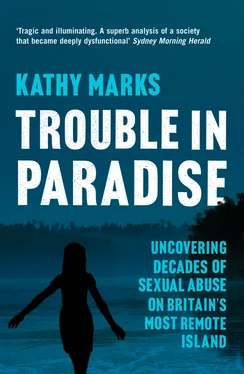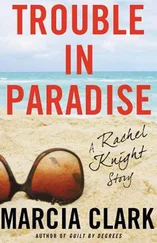In 2001 he told me, referring to the investigation, that ‘the sum of it all is pure speculation, and whether you want to call it rape, I don’t know’. He added, ‘There’s been an awful lot of Polynesian blood put into the island. The girls resorted to sexual activity at a very early age, and that was carried on by the women into Pitcairn.’ Ford claimed that Gail Cox, the English constable, had ‘ingratiated herself’ with the locals, ‘wheedling’ information out of the girls during informal ‘kitchen table’ chats, and precipitating a ‘sweep’ by police of Pitcairn women. In his view, it would not be surprising if the inhabitants of a remote tropical island were ‘out of harmony with the laws of downtown London’.
Also quoted in those early days was Glynn Christian, a former television chef and author of a biography of Fletcher Christian, Fragile Paradise . Accessible and articulate, Glynn was a seventh-generation descendant of Fletcher, and had grown up in New Zealand. In a telephone interview, he spoke of the ‘goodness and niceness’ of the Pitcairners, whom he met in 1980 while conducting research on the island, and, in a remarkable observation, said that ‘to be there makes you think there’s no such thing as original sin’. Glynn ascribed the current crisis to British neglect, which he claimed had left the Pitcairners in a social timewarp. In his opinion, the Pitcairn men had known no better. ‘It’s not wilful badness,’ he said. ‘You can’t punish a child for doing something wrong if he’s not been told that it’s wrong.’
Once the British Foreign Office had resolved to act on the child abuse allegations, it set about addressing a problem identified by its advisers many years earlier: Pitcairn’s lack of a legal infrastructure, which, given recent developments, needed to be rectified swiftly. A series of appointments were made, among the most important of which was the naming of Simon Moore as Pitcairn Public Prosecutor. Moore was already Crown Solicitor for Auckland, the chief prosecuting counsel in New Zealand’s largest and most crime-ridden city; now he was to take on a similar job for an island of a few dozen people.
Christine Gordon, a senior colleague, was appointed Deputy Public Prosecutor. The pair regarded themselves as a formidable team. Moore, an effervescent character with a mane of golden-brown hair, rode with the Auckland hunt and belonged to that city’s exclusive Northern Club. He was a master of courtroom theatrics. Gordon, a petite blonde with a ferocious grasp of detail, smiled sweetly while asking the killer questions.
Having prosecuted a previous case of child abuse in a closed community, Gordon correctly predicted that the allegations would proliferate. By mid-2001 the two lawyers had enough evidence to charge 13 men; Moore, though, paused to consider another factor—the public interest. How would a prosecution affect the tiny, isolated society? Would it really collapse if men were put in jail? He and Gordon realised that they could not answer these questions while sitting in an office block in central Auckland. They would have to make the journey to Pitcairn, to see for themselves how the community operated.
In October 2001, accompanied by Karen Vaughan, the Wellington-based detective, the prosecutors travelled to Pitcairn on a container ship, the Argentine Star . The Deputy Governor, Karen Wolstenholme, was already on the island, as were several new resident outsiders, British authorities having belatedly acknowledged the need for some external supervision. Two New Zealand social workers were watching over the half-dozen children, while two British Ministry of Defence police officers—known as MDPs and licensed to carry firearms—were monitoring the suspects and keeping communal tensions in check. The two pairs, sent out on rotating three-month tours of duty, were resented by the majority of islanders, who grumbled that Pitcairn had become a police state and accused Britain of planting spies in their midst.
Standing on the deck of the Argentine Star , Christine Gordon had ‘a knot in my stomach when I saw the dot on the horizon, because we didn’t know what the situation would be there’. As it turned out, and just as Peter George and Dennis McGookin had experienced, the Pitcairners went out of their way to be friendly, even if these latest visitors found them a little overwhelming at first. Simon Moore recalls, when the longboat came out, ‘the assortment of humanity, wearing different coloured T-shirts, some carrying huge frozen fish on their shoulders, clambering aboard just like pirates and swarming around the ship in all directions’. He also observed the efficiency with which the locals stocked up on duty-free cigarettes and alcohol. ‘We’d been told they didn’t drink,’ says Moore, whom I interviewed in his oak-panelled office in 2005. ‘So I was astonished to see the quantities of booze unloaded, and boxes of eggs and frozen meat, and anything else you can imagine—wads of cardboard, mattresses, chairs—all dropped down into the longboat.’
The next morning the visitors were invited on a community fishing trip. At one point Simon Moore found himself in a small boat driven by Dave Brown, one of the alleged child abusers. Dave instructed him to lie flat, then he revved up the engine and the boat shot forward. ‘I looked up and saw that we were hurtling towards this solid rock face,’ says Moore. ‘Just as we were about to hit it, or so it seemed, the swell dropped and exposed the mouth of a cave.’ Dave deposited him on a patch of sand deep inside the cave, where the other visitors had already been dropped off. ‘I thought perfect,’ says Moore, rolling his eyes. ‘If they wanted to abandon us, this is the way to do it.’ A little later, though, they were picked up, and everyone proceeded to fish for a local species, nanwe. Despite the rough seas, the islanders hauled up hundreds of fish.
The catch was destined for a ‘fish fry’ that afternoon at The Landing, in celebration of Dave’s birthday. The fish were cleaned and the guts thrown off the end of the jetty, attracting a reef shark, which Randy Christian, another of the accused men, caught. Then, as one witness tells it, ‘Randy got a sledgehammer and hit the shark so hard that the hammer went right through its head and came out the other side. The shark was writhing in agony, the women were gagging, and Randy just stood there grinning, with the bloody sledgehammer in his hand.’
By coincidence, it was also Simon Moore’s birthday; so after regaling Dave with a rendition of ‘Happy Birthday’, the Pitcairners sang ‘Happy Birthday’ to their Public Prosecutor. Dave later complained to someone, ‘That prick Moore, we put on a birthday party for him the first time he came, and I thought he’d go easy on us as a result of that, the bastard.’
The fishing expedition was the first of numerous communal events, including dinners and sports days, that were staged for the visitors’ benefit during their fortnight on Pitcairn. At a tennis tournament, Karen Vaughan found herself partnering Dave in a doubles match. Simon Moore played cricket in a team skippered by Dave, and at a picnic later on chatted amicably with Randy, the rival captain. The prosecutors also attended a ‘cultural day’ at the school, where Christine Gordon was taught basket weaving, and Steve Christian, the mayor and another child abuse suspect, showed Moore how to carve a wooden dolphin.
That must have been weird, I say. Moore leans back in his hair, hands behind his head. ‘Yes. But then everything was weird on that trip. Normally we never see the people we’re prosecuting until we get into court, but here we were mixing with them quite closely.’
Some of the outsiders on the island voiced cynicism about the community activities, saying they had never seen the Pitcairn people display such unity and goodwill. Then, just before the visitors left, the islanders sang them their traditional farewell song, ‘Sweet Bye and Bye’, in the public hall. Moore says, ‘I was genuinely quite moved by it, but others, apparently, were not, because they saw it as yet another show for us.’
Читать дальше












